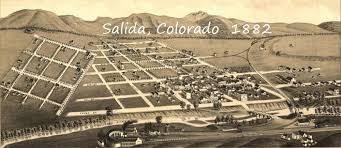As we prepare for the upcoming Christmas celebration, I thought it might be interesting to see what people thought was important about the holiday and their lives in Colorado prior to 1900. Here is a sampling, through newspaper articles throughout the state, along with some background and history thrown in.
 |
| From Wikipedia, Silver Plume's train station |
From the December 19, 1885 Silver Standard, a paper from Silver Plume, Colorado we have a collection of weather proverbs and sayings. At an elevation of 9100 feet, it is located near Clear Creek off of Interstate 70. In the early days it was quite the boom town and has a rich history, which is shares with Georgetown.
 |
| 1882 map of Salida Colorado. |
Even School children were into telling Christmas stories. Here is the announcement from the Salida Mail, Salida Colorado on December 25, 1984. Salida is located along the Arkansas river and is now known for its arts community. The Denver & Rio Grande was instrumental in starting the town when they ran tracks through there on the way to the ore rich mines near Leadville and Lake/Chaffee counties.
 |
| Georgetown 1867 from Wikicommons |
In Georgetown, Colorado in 1870, Christmas was celebrated in style according to the Colorado Miner of December 29 of that year. As mentioned in the information about Silver Plume, Georgetown as also in the center of mining activity in the early days of Colorado. It was Georgetown that was one of the first areas where gold was found, but silver is what made it the town it was. Today, there is still a train ride, 'The Georgetown Loop' that thrills many a visitor.
And finally from the Colorado Springs Gazette of December 27, 1873. Founded in 1871 as a resort town, Colorado Springs sits on the base of Pikes Peak. The Summit house was built on Pikes Peak as a weather station by the Army Signal Corps. Imagine living at 14, 115 during the cold, windy winter months, and it is very windy up there at that time of year.
 |
| Pikes Peak Signal Station from Library of Congress |
"A Merry Christmas to everybody" was sent down by telegraph from the summit of Pike's Peak last Wednesday evening.
These and other stories influence my own writing. The novella, "Gift of Forgiveness" takes place on the back side of Pikes Peak, during Christmas time, near the area of Lake George. Here is a short excerpt:
Nettie couldn't deny how much John meant to all of them. She even admitted she was starting to rely on John being around, and it frightened her. All those who she'd relied on were now dead, and she didn't want that for John. It's better that I rely upon myself. That way, if anything goes wrong, I have only myself to blame, Nettie thought. It's also an easier way to get through life. If you don't expect anything of anyone, you are never disappointed. But that thought left her feeling empty. Shaking such thoughts out of her head, Nettie saw that Albert was busy showing off his find. The drummer, Leonard Shiesley, was admiring it. "Where did you find such a fine specimen?" he asked.
"Out a ways from here, over in one of the gulches."
"Perhaps, if the weather holds, and your mother wouldn't mind, you could show me?" Shiesley asked. "If this is what I think it is, you may have found something pretty valuable."
"You mean, diamonds?" Albert asked, excitement showing on his face.
"Not diamonds, but it may be topaz. I'll know more after I see where you found it."
"Well, what do ya know about that, you just may soon be a well-off young man," John said, ruffling Albert's hair.
"Well, I'd give most of it to Mother and Ila, and keep just a little for myself," Albert insisted.
"Let's not count our money before we know for sure," cautioned Nettie.
"Listen to your mother, young man," Miss Ehbert added. "She knows what she's talking about."
Nettie was surprised at Lida Ehbert's statement. So far, she had always been silent, except for requesting something she needed. She had been a pleasant, but quiet boarder.
"Thank you Miss Ehbert," Nettie told Lida. "It is exciting, but…"
"I know," was Lida's cryptic reply.
"Can I go, Mother? Please?" Albert asked.
"If the weather holds."
"You're the bestest."
"I'll make sure nothing happens," Shiesley declared.
Doris Gardner-McCraw -
Author, Speaker, Historian-specializing in
Colorado and Women's History
Writing as
Angela Raines - author: Where Love & History Meet
For a list of Angela Raines Books: Here































